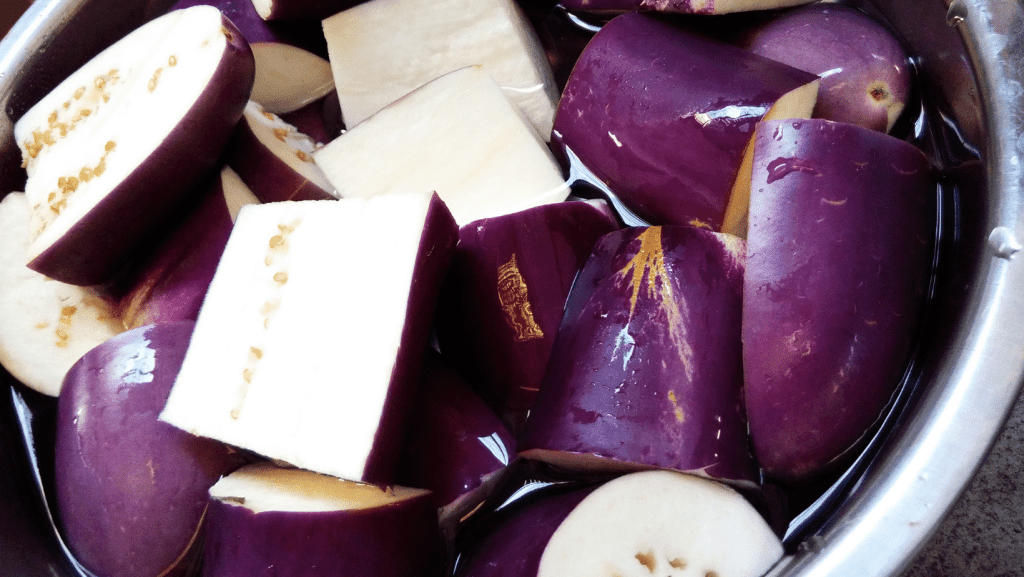If you’ve got yourself some leftover or spare eggplant, you may be wondering If your chickens can eat raw eggplant.
Why? Because the same thing happened to me. I had my suspicions because the plant itself is part of the nightshade family. But, we humans and other animals eat eggplant all the time, so what gives?
Here we go through if chickens can eat raw eggplant, what health benefits it has for your hens, and what to watch out for.
Can Chickens Eat Raw Eggplant?
Firstly note eggplant/aubergine is a part of the nightshade family. Nightshade plants and vegetables include small quantities of Alkaloids, which in high doses can be toxic. Aside from Eggplant, potatoes, tomatoes, and peppers are also nightshades.
But it’s actually only the eggplant leaves and eggplant stems that can be toxic if consumed in large amounts, as they contain more alkaloids. So, chickens can eat raw eggplant, and it’s completely safe.
That’s great news because eggplants are an excellent source of vitamins, minerals, and antioxidants, both for us and for our feathered friends. Chickens aren’t fussy, and they are very fond of fruit and vegetables. But, they do especially love the raw flesh of the eggplant and they’ll demolish the whole lot, including the eggplant skin and seeds. Just simply cut the eggplant into slices or in quarters exposing the flesh and let the frenzy begin.
Plus, If you serve cold raw eggplants during the hot summer months, they’ll go a long way toward keeping your chickens cool, happy, and healthy. So chickens can eat raw eggplant, and as it turns out, it’s a very healthy and safe table scrap you can feed your chickens! But, as with all fruits and vegetables, eggplants should be given in moderation for a well-balanced diet.
Health Benefits of Raw Eggplant for Chickens
Raw eggplant is a highly nutritious fruit for chickens. It’ll help keep them healthy, stay regular, and provide a bunch of nutrients that help with general immunity.
Some nutritional elements in eggplant include:
- Antioxidants: Boost the chicken’s immune system, protect cell membranes, prevent neuro-inflammation, and increase blood flow.
- Vitamins C, K: Help with the absorption of iron, immune system, wound healing, healthy cartilage, and bone mineralization. Not enough vitamin K could be fatal to chickens since it affects blood coagulation.
- Potassium: Helps boost muscle development, fluid balance, and nerve signals.
- Folic Acid: Increases egg production.
- Phosphorous: Helps in egg development and it’s necessary for your chicken to metabolize calcium.
- Fiber: Keeps chickens full and is good for their digestive health.
- Manganese: Helps in growth and bone development. It also improves eggshell quality.
How Often Should Chickens Eat Raw Eggplant?
Eggplants, along with other fruit and vegetables, should be given to chickens as treats. They shouldn’t constitute more than about 10-20% of a chicken’s daily diet.
Since it’s specially formulated to fulfill all their nutritional needs, a quality chicken feed mix containing protein, grains, and seeds should make up between 80-90% of chickens’ food intake. If possible, try to avoid other bird feeds, as they won’t be specialized for chickens and have the right amount of each ingredient. For example, although chickens can eat game bird feed, it contains too much protein for what their diet requires.
If you want to stick to a more balanced approach, you can cut your raw eggplant into cubes and mix it with other vegetables. For example, you can feed your chickens beets, sweet potatoes, carrot, or other fruit and vegetables all together and feed it to your chooks as a treat a couple of times a week! You can even add seeds in the mix for an added nutrient boost, like flax seeds for chickens, sunflower seeds, or even poppy seeds.
You can also feed your chicken a whole eggplant. Halve a raw eggplant and serve it facing upwards, or hang it so that your chickens can nibble at it. You can also feed chickens steamed or cooked eggplant too.
Although eggplant is full of nutrients, it doesn’t contain enough calcium for a chicken’s needs. If they eat too much eggplant, like every day for example, your chickens will be too full to forage or eat their feed, which could result in weight loss and declining health. Their egg production will also fall if they’re not getting enough calcium.
Considerations When Feeding Raw Eggplant to Your Chickens

Always remove the stem, leaves, and calyx (the protective green whorl) of the eggplant before serving to your chickens, since those green parts contain a high level of alkaloids, known as solanine. Although chickens are wonderful at telling what’s good for them and what’s dangerous, at these high levels, the stem and leaves can actually be toxic to your chickens even if consumed in low amounts.
If you do grow eggplants in your garden it’s always best to keep your chickens away from them. Simply cover your crop with material or separate them in a glasshouse or fruit and vegetable garden away from curious chooks!
If you are feeding your chickens store-bought eggplants, always wash them to get rid of any pesticide residue that may still be present.
In a Nutshell
So, can chickens eat raw eggplant? Yes, so long as you remove the stem, leaves, and calyx of the eggplant, as these can be toxic if consumed in high doses. If you do, your chickens will enjoy a delicious treat packed with nutrients that can boost your chicken’s health and productivity.
Just like any fruit or vegetable, always feed your chickens in moderation to ensure they have a balanced diet for their health, wellbeing, and egg production.
